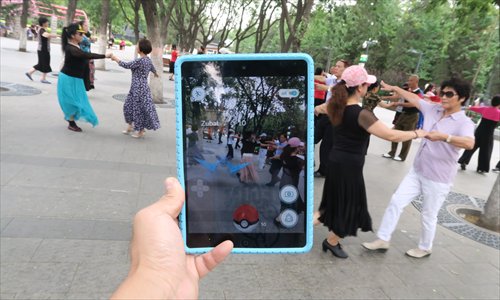GPS-blocked pocket monster trainers in China pull out all the stops to get access to Pokemon Go

Through the Chinese cracked versions and counterfeits of Pokemon Go, players are able to catch monsters in China, where the game is unavailable. Photo: Li Hao/GT
Sheldon Sun, a 30-year-old self-proclaimed geek and Pokemon trainer in Beijing, is proud to be one of the few Chinese players who could catch pocket monsters.
"I was so excited when I caught my first monster on my desk in the office," said Sun, who had been jealous of his friends overseas posting screenshots from the game for days.
Pokemon Go, released on July 6 by the Pokemon Company, which is 32 percent owned by Japanese video game giant Nintendo, has quickly become viral all over the world, ranking among the most downloaded apps.
It ranked top on Monday as the most downloaded in the free app category in 33 countries including the US, the UK, New Zealand and Spain, according to app store ranking service APPLyzer.
The game uses AR (augmented reality) technology to superimpose an adorable monster into a real world setting when a player looks at the scene through his or her smartphone camera. It uses the GPS (global position system) and other mapping capabilities in smartphones to allow players to find and catch monsters in parks, subway stations and other locations and train them for battle.
However, the game is currently not officially available in China.
Chinese users cannot get access to the game from the app stores. And they are generally not able to access their Google accounts, which is required to play the game, since Google is inaccessible in China without VPN (virtual private network). Furthermore, GPS signals from China, as well as several other countries and regions, are blocked by the company.
But Chinese users have refused to give up. Like Sun, many have gone to great lengths to get access.
They use VPN to use their Google accounts. Software has been developed to not only falsify the phone's location to make it appear in another country, but also allow the player to roam the map by clicking the arrows on the screen instead of going to the physical locations.
The game's inaccessibility has even become a business opportunity.
Dozens of Pokemon Go look-alikes are available in Chinese app stores. And some shops on Chinese online retail platform taobao.com are selling Google and overseas Apple accounts, which they claim allow Chinese users to play the game.
One of the top sellers has made more than 19,600 deals as of Monday.
Though happy to have access to the game, Sun, however, conceded that the Chinese cracked versions go against what the game was originally designed to do. "[It] makes indoorsy people even more unwilling to get out of their chair," he said.
Li Xin agrees. He is one of the players who are determined to sit tight and wait it out.
Li, 28, a CEO of a cultural exchange company in Beijing and a game enthusiast since childhood, said he would rather wait for the game to be officially available in China.
"I would want to try the game as soon as possible, but out of my love for Pokemon and my consciousness as a true player, I can't accept the gaming experience on the so-called cracked versions," he said.
Li's love for the pocket monsters started from the age of the Game Boy, a handheld gaming device first released in 1989 by Nintendo, for which the original Pokemon games were created.
The Chinese mobile game market became the world's largest in 2015 with $7.1 billion in revenues, according to research from the Netherlands-based firm Newzoo.
But the industry is not without its problems. According to Li, copyright issues seem inevitable.
"When a hit product like Pokemon Go comes out, [Chinese game developers] would use a similar name and counterfeit one really fast, to attract customers, boost downloads, and probably earn money," he said.
Newspaper headline: Catch ‘em all!